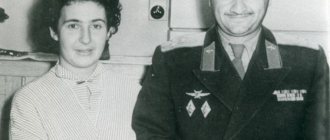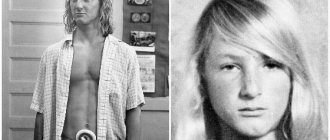Biography
Alisa Brunovna's entire life is dedicated to art, she continued the acting dynasty, and the theater surname Freundlich is still the standard of acting.
The mother of the future actress, Ksenia Fedorovna Freindlikh (nee Fedorova), lived in Pskov in her youth and took part in amateur performances. Soon she moved to Leningrad, where at the drama courses of the Theater of Working Youth she met the German-born actor Bruno Freundlich. His mother was a German, Charlotte Friedrichovna (née Seitz), and his father was Arthur Ivanovich Freundlich. Both the Seitzes and the Freundlichs finally moved to Russia back in the 18th century.
Alisa Brunovna recalls: “I was born in a house on St. Isaac’s Square. From the windows of our apartment the cathedral was clearly visible, and a five-minute walk from the house stood the famous Bronze Horseman and a breathtaking view of the Neva with its super-beauty opened up. The charm of my city entered my soul from childhood and bewitched me for the rest of my life...”
As the actress herself later admitted, her mother wanted her daughter to have a different name - Natasha. Alice's father and grandmother insisted on her, saying that Natalya Brunovna Freundlich was a strange mess.
Just before the war, Alice's parents separated. Bruno Freundlich went to Tashkent with the theater. Alisa and her mother remained in Leningrad and survived the blockade. Ksenia Fedorovna left the theater and worked as an accountant. And in December 1945, she and her daughter moved to relatives in Tallinn. Here Alisa studied from third to fifth grade at a Russian school.
“In the lower grades, I studied well, I was even an excellent student, but as physics, chemistry and other mathematics appeared in my life, I turned into an average student, a C student. All technical sciences are a dark forest for me,” says Alisa Brunovna.
Returning to Leningrad, Alisa joined the school theater group, headed by Maria Prizvan-Sokolova, a famous Soviet artist. Maria Alexandrovna immediately liked the girl, she saw a star in her. Alice spent all her free time with her teacher, who taught her the basics of acting.
After graduating from school in 1953, the girl applied to the Leningrad Theater Institute named after A. N. Ostrovsky and was accepted into Boris Zone’s course. An outstanding teacher trained such renowned stage masters as Zinaida Sharko, Pavel Kadochnikov, Nikolai Trofimov.
During her studies, Alisa Freindlich received many thanks and awards, including a certificate for exemplary study.
Just before graduation, Boris Zon gave Alisa Brunovna his photo, writing on the back: “Dear Alice! You do not dare to leave in vain any of your inclinations: to play, read, sing, dance. Only in this case will you be able to keep up with everything and be happy.” He also signed the reference given to the actress, summing up that Freundlich was recommended for leading work in drama theaters of regional and republican significance.
The beginning of the theatrical journey
Freundlich returned to school No. 239, where she immediately signed up for classes in a theater club, headed by the famous actress Maria Prizvan-Sokolova. The teacher really liked the girl, and at first glance she recognized her as a future actress. Alice spent all her free time in the circle, Maria taught the young talent the basics of theatrical art.
In 1953, Freundlich graduated from school. She had no doubt that she wanted to become an actress. When choosing a direction - musical or dramatic - my father played a significant role. Despite the fact that the girl had a strong voice, Bruno Arturovich dissuaded her from opera, and she decided to enter the Leningrad Theater Institute named after A. N. Ostrovsky. Freundlich studied well, as evidenced by certificates, awards and thanks for successful studies and excellent behavior.
While studying in her third year, Alisa fell head over heels in love with fellow student Vladimir Karasev. Early love ended in marriage, but it did not last long; after graduation, the couple broke up. Even in her student years, Alice got her first film roles, these were episodes in the films “Talents and Admirers” and “An Unfinished Tale.”
In 1957, Freundlich successfully graduated from the institute. She played impeccably in the graduation production of “The Morals of Mrs. Dulskaya,” which helped her later become an actress at the Leningrad Drama Theater named after V.F. Komissarzhevskaya. At first she got the roles of hooligans and boys, she cried at night and suffered because she was not playing at all what she would like. Nevertheless, this theater became an excellent school for her. Here she played about a dozen roles and during this time managed to star in the films “The Tale of the Newlyweds” and “The City Lights Up.”
Theater
The graduation performance “The Morals of Mrs. Dulskaya,” in which Alisa Freindlich played the main role, helped her get into the troupe of the Leningrad Drama Theater named after V.F. Komissarzhevskaya.
Komissarzhevskaya Theater: 1957-1961
The actress’s very first work on the professional stage was the role of fourteen-year-old teenager Goga in the production of “Man with a Briefcase” based on the play of the same name by Alexei Faiko. Before Alisa Brunovna, Maria Babanova performed the same role at the Theater of the Revolution. According to the script, the boy constantly spoke French, and Freundlich did not know him at all, and therefore she had to learn the necessary phrases. It is noteworthy that she was “blessed” for the role of Goga by Babanova herself, whom she encountered in the foyer of the theater.
After transforming into a boy, as the actress herself said, there was “just a whole chain of different Olya, Mash, Ver, in general, a whole flock of girls, rather annoyingly similar to each other.”
Later, Alisa Brunovna about Hemingway’s Fifth Column...”
Lensovet Theater: 1961—1983
Work at the Lensoveta Theater turned out to be the most fruitful in the life of Alisa Freindlich, and she herself was even called “the first lady of the theater.” Among the actress's repertoire were: Celia Peacham from Brecht's "The Threepenny Opera", Juliet Capulet from Shakespeare's "Romeo and Juliet", Katerina Ivanovna from Dostoevsky's "Crime and Punishment".
In 1966, when the chief director and artistic director Igor Vladimirov staged The Threepenny Opera, he considered Freundlich, who was exactly the right age, for the role of young Polly. Despite this, the actress played old Miss Celia Peachum, who spoke in a hoarse, torn voice.
The Kid from the play “The Kid and Carlson” also stood out, the production of which was attended by both adults and children with equal pleasure. Freundlich said that she played this role in one go, and to this day she considers it the most likable in her theatrical career.
The actress served in the Leningrad City Council for exactly twenty-two seasons. And according to Alisa Brunovna, it was Igor Vladimirov who helped her succeed creatively. Especially for her, he restored Arbuzov’s play “Tanya” and staged Zorin’s “Warsaw Melody”.
BDT: 1983 - present
Since 1983, Alisa Freindlikh has been one of the leading actresses of the Bolshoi Drama Theater named after G. A. Tovstonogov.
Alisa Brunovna’s debut on the stage of the Bolshoi Drama Theater took place in the play “A Film Story with One Intermission” based on the play “Blonde” by Alexander Volodin. For a long time, the artistic director of the theater, Georgy Tovstonogov, could not find an “ebulliently active blonde” in his troupe and eventually offered the main role to Freundlich.
One of the actress’s major and memorable works is Lady Milford in Schiller’s “Cunning and Love,” during the creation of which she first met director Temur Chkheidze.
In addition, Freundlich had three roles in Simon’s musical “The Last Ardent Lover” and Nastya in Maxim Gorky’s play “The Lower Depths.”
On the stage of this theater, several remarkable events took place in the life of Alisa Freundlich: she fulfilled her long-time dream by playing Lady Macbeth in the play based on the play of the same name by William Shakespeare, and teamed up with her old friend Oleg Basilashvili and daughter Varvara Vladimirova in several productions, including “Summer” one year", "Lessons in Tango and Love", "Uncle's Dream" and "California Suite".
The actress still dreams of playing the role of Bulgakov’s Margarita, but she understands that she is no longer the same age. She also regrets that she played too little in productions of Dostoevsky, who is one of her favorite authors.
Participates in performances:
Main stage of the Bolshoi Drama Theater: “Uncle’s Dream” by F. Dostoevsky (Marya Alexandrovna Moskaleva), “One Summer” based on E. Thompson’s play “On the Golden Lake” (Ethel Thayer), “Tolstoy’s War and Peace” based on the novel by L. Tolstoy “ War and Peace" (Natalya Ilyinichna, museum employee).
Second stage of the Bolshoi Drama Theater (Kamennoostrovsky Theatre): “Alice” by A. Moguchy, S. Nosov, S. Shchagina (Alice).
Students
The Theater Institute is inscribed in the biography of Alisa Freindlich as a red thread. She entered it the first time, the preparation was serious: even in the school theater studio they noticed a talented girl - she was directed by M. Prizvan-Sokolova. She, together with her husband, the famous director P. Weisbrem, consulted their favorite every day. So she passed the entrance exams and got into the B. Zone course.
At the institute she was prepared for character roles, not suspecting that she would later play the roles of the first heroines - including Juliet. Her magnificent voice, a strong mezzo-soprano, immediately set her apart from the rest. Alice studied excellently and even managed to get married. True, the student marriage with Vladimir Karasev did not last long.
Alisa Brunovna brilliantly graduated from the institute with a recommendation for leading roles in major theaters.
Cinema
While a student, Alisa Freindlich made her film debut, playing in episodes of “The Unfinished Tale” and the drama “Talents and Admirers.”
In the 60s, the actress was almost never invited to lead roles: a schoolgirl in “The Immortal Song”, a barmaid in “Striped Flight”, Ellochka the Ogress in the film “12 Chairs”. The exception was the tragicomedy “Adventures of a Dentist.”
The artist’s first big work was her heroine Anna Semyonovna Kapitonova in the film anthology based on Chekhov’s stories “Family Happiness.” Then there were: Katarina in Igor Vladimirov’s film-play “The Taming of the Shrew”, the Commander’s wife in Evgeniy Khrinyuk’s melodrama “Anna and the Commander”, Baroness de Champagne in the musical comedy “Straw Hat” by Leonid Kvinikhidze and Anna Aleksandrovna Vyrubova in the historical film “Agony” by Elem Klimov "
"Love affair at work"
1976 was a turning point for Alisa Brunovna. She was invited by Eldar Ryazanov to play the role of Lyudmila Prokofyevna Kalugina (Mymry) in the comedy melodrama “Office Romance,” which was released in 1977. The actress says that she became interested in this role because she was curious about the metamorphosis that occurs with her heroine. As the film progresses, she transforms from a strict, ugly boss into a charming, cheerful woman.
When creating the look of her heroine in the first part of the film, Freundlich went through the entire Mosfilm dressing room to find a suitable size 52 crimple suit. The artist, by her own admission, took her gait from life: “Thankfully there were plenty of bossy women who walked like that, so I didn’t have to invent much.”
The duet of Alisa Freindlich with Andrei Myagkov in this film turned out to be simply incomparable. Touching and funny, they immediately won the hearts of the audience. The actress received many letters in which women wrote: “After your film, we immediately went to the hairdresser, gave ourselves the same hairstyle, sewed ourselves the same dress and generally put ourselves in order.”
The image of Lyudmila Kalugina brought Freundlich all-Union popularity and fame. For this role she was recognized as the best actress of the year according to the Soviet Screen magazine.
In 1978, the artist, together with her husband Igor Vladimirov, starred in the melodrama “Old-Fashioned Comedy” based on the play of the same name by Arbuzov. This is the story of the acquaintance of two middle-aged people - a circus cashier and the head doctor of a sanatorium.
And the next year was replenished with two more wonderful works. In Andrei Tarkovsky's fantastic parable "Stalker" Alisa Freindlich played the wife of the main character. This is how actress Liya Akhedzhakova evaluates this small role: “There is a powerful hidden suffering there. There is destiny."
Another work was the role of Queen Anne in the adventure film by Georgy Yungvald-Khilkevich “D'Artagnan and the Three Musketeers” based on the novel by Alexandre Dumas. “I have never seen a living queen, except on TV or in the press. The director and I wanted to make an absolutely earthly woman, whom nothing passed by - neither love, nor jealousy, nor fear, nor the triumph of victory. She is characterized by all emotions and all human weaknesses. Yes, queen! But behind the external ethical grid hides a living person who experiences the same feelings as anyone else,” is how Alisa Brunovna herself described her character.
Alisa Freindlich starred in diverse films, while feeling at home everywhere. And yet, the main genres remained drama and melodrama: “Dangerous Age”, “A Cage for Canaries”, “Sorry”, “Success”, “Everyday Life and Holidays of Serafima Glyukina”.
The actress's light, relaxed manner of acting was often combined with subtle comedy. This was especially evident in the films of Eldar Ryazanov, with whom she really enjoyed working. After the success of "Office Romance", she gladly accepted his invitation to play the role of Kharita Ignatievna Ogudalova in the film "Cruel Romance" based on Ostrovsky's play "Dowry". Ryazanov managed to show that Ogudalova is just an unhappy woman, widowed early, without a livelihood, and she has her own internal drama. This is exactly how Freundlich played her.
Then Alisa Brunovna was invited to star in the continuation of “The Musketeers” - “The Musketeers Twenty Years Later” and “The Secret of Queen Anne.” However, these films were not as successful as the first film.
But the actress’s great success was the role of the writer Irina Dmitrievna in Valery Todorovsky’s drama “Moscow Evenings.” She brought Alisa Freindlich her first Nika Award statuette for Best Supporting Actress.
In 2001, Freundlich played the main role in the series “Women's Logic”. Its heroine is the restless pensioner Olga Petrovna Tumanova, who is in love with detective stories. Due to circumstances, she begins a murder investigation and brings it to the end, despite the skepticism of others. The film was a success with audiences, and soon the second and third parts were released.
In the film based on Dina Rubina’s story of the same name “On Verkhnyaya Maslovka,” the young artist Evgeny Mironov became the actress’s partner on the set. Alisa Freindlich's character is 87-year-old sculptor Anna Borisovna, who lives out her life in an old workshop. Alisa Brunovna won the second Nika Award for Best Actress.
In 2008, the biographical film “A Room and a Half, or a Sentimental Journey to the Homeland” was released. Freundlich got an unusual role - the mother of the poet Joseph Brodsky. According to the actress herself, she was not familiar with Brodsky, but she really loves his poems.
In 2014, Alisa Freindlich played one of the main roles in the melodrama “The Martha Line.” The picture told the story of a letter of apology that a little boy wrote to a girl back in besieged Leningrad. Already in modern St. Petersburg, the main characters are trying to deliver it to the addressee.
"Big"
One of Alisa Brunovna’s last works was in Valery Todorovsky’s drama “Bolshoi”. This is not the first time that the Bolshoi Theater has become a film set. But for the first time, a film was shot on the historical stage of this legendary theater, about which even professional dancers say: “This is how everything happens here, this is a real ballet.” In world cinema, you can recall a few films with subjects related to ballet. There were almost no of them in Russian cinema; not a single one was filmed in post-Soviet Russia. Todorovsky's new film actually opens up the world of ballet to the silver screen.
The story of young Yulia Olshanskaya's rise to the ballet Olympus begins in a provincial mining town: she is noticed dancing in the street by former ballet dancer Pototsky (Alexander Domogarov). Once he himself showed great promise, but now he cannot ignore his unique talent and predicts for the girl the future of a great ballerina, worthy of the main stage of the country.
Alisa Freindlikh, who played the teacher Yulia, recalls: “During the time that has passed since our first work - “Moscow Evenings” (1994), Todorovsky’s name has been marked by so many wonderful films that even if I had been in a semi-conscious state, I probably would have I would throw away all illnesses and busyness and run...
I liked the story. And I liked the role. My aunt (Beletskaya) is tough and sharp—it’s always interesting. In addition, ballet has been a long-time passion of mine. I’m a ballet fanatic, I used to go to the Mariinsky Theater as a child... Valery Petrovich said that in Beletskaya they need a very tough disciplinary woman who can afford to hit and pinch... She should be of iron when she teaches. And she must have enough kindness and understanding to feel compassion for the student.
Dostoevsky said about this: “What is the human soul? This is a constant struggle between God and the devil." Well, therefore, good with evil. It was at this intersection of opposites that I wanted to create a character.”
The famous actress continues to act in films and play in her native theater. Films with her participation are included in the “golden fund” of Russian cinema.
Discography
- 1980 - “Alice Freundlich Sings” - “Melody”
- 2006 - “Alice Freundlich. Favorites" - "Quad-Disc"
“Absolute musicality, impeccable hearing, and most importantly, a sense of style of the work, loyalty to the author’s plan, the director’s plan and, finally, the exact correspondence of the performance of the song to the performance of the entire role - this is what is characteristic of the People’s Artist of the RSFSR, State Prize laureate Alisa Brunovna Freindlich,” noted chief director of the St. Petersburg Theater of Musical Comedy Alexander Belinsky.
Personal life
Alisa Freindlich first married in 1956 to her classmate Vladimir Karasev. The marriage did not last long - after graduating from the institute, the couple broke up.
The actress’s second husband was theater director and actor Igor Vladimirov. Alisa Brunovna says: “Igor Petrovich was sixteen years older than me, and I became his third wife. When we met, I was a completely blank slate in all everyday relationships. As an actress, I was already formed, I played a lot, if I were an inconspicuous speck, he would not have invited me to the theater. He was very smart, with an amazing sense of humor. I was interested - I greedily, like a sponge, absorbed everything that he knew, knew how, could, and was rich in. And I wasn’t afraid to marry him, because everything about him was interesting to me, I had something to learn from him.”
On March 13, 1968, their daughter Varvara was born. The girl grew up in an acting family and from childhood she understood that she would be an actress. She graduated from the Leningrad State Institute of Theater, Music and Cinematography, starred in several full-length films, and plays in the Bolshoi Drama Theater.
The family life of Alisa Freindlich and Igor Vladimirov did not work out, and in the early 80s they separated. Just then, the actress began an affair with a young actor of the Lensovet Theater named Yuri Solovey, who became her third husband. He had never studied anywhere before; he got into the theater by accident, but, according to Alice, he was a very talented artist and painter, a true self-taught person.
Alisa Brunovna's third marriage did not last long. This is how she explains the reason for the divorce: “Since Yuri did not graduate from anything, he had a lot of problems, although he is a very gifted person. And the fact that everything was always in order with me, and everything was always not in order with him, had a great effect on our relationship. When we realized that there was more stress than the body could withstand, we parted very amicably...”
The actress remembers her ex-husbands with warmth: “I had talented, unusually interesting husbands: Igor Vladimirov and Yuri Solovey.” Freundlich does not consider herself lonely, because she has a daughter and beloved grandchildren.
Interesting Facts
- Alisa Freindlich is adored by her colleagues on stage and on the set. Mikhail Boyarsky calls her his teacher. And Maria Lavrova, the daughter of Freundlich’s close friend Kirill Lavrov, admits that Alisa Brunovna reminds her of the French actress Annie Girardot.
- The artist loves to cook baked goods and sweet foods.
- Unlike her heroine in Office Romance, who was completely indifferent to mushrooms, the actress constantly goes into the forest to collect a whole basket.
Third Theater - BDT
Alisa Brunovna came to the Tovstonogov Theater as a mature, bright actress. She played Irina in Volodin's play, Dostoevsky's Glafira in "Wolves and Sheep", a series of characters in plays by Chekhov, Schiller, Gorky, Shakespeare and many others.
Now with her participation there is a production of “Uncle’s Dream”, where she plays the role of Moskaleva, “One Summer”, in which she plays the role of E. Teiler, and a production based on the works of L. Tolstoy, where she plays a museum worker. Her work in the play “Alice” is interesting.
To this day, Alisa Brunovna is associated with the BDT. The theater management signed a contract with her and are confident that she will not let her down. Only when the ex-husband of Tarasov’s daughter died in an accident did she go to the performance. Everyone who knows her speaks of the deep integrity of this amazing woman. The daughter believes that she was an ideal mother-in-law.
Interview
About the theater:
“Theater for me is like a continuation of childhood. Because it seems to me that stage acting is, first of all, such faith in the proposed circumstances, equal to childhood. Because no one believes in the game and in the circumstances that he sets for himself as much as children. After all, there is no stage embodiment without stage imagination. And children have an imagination that few adults can boast of.”
People's Artist of the Russian Federation Georgy Shtil about the actress:
“Alice Freindlikh is, of course, one of the most outstanding actresses in Russia. And an extremely honest, decent, intelligent person, of which there are few today. Moreover, she is not only a unique actress, but also a brilliant mother. She raised a wonderful daughter, Varya and I worked together, and she is truly a wonderful person - it couldn’t be better. And the country knows what Alisa Brunovna is on stage even without me. She works honestly and beautifully. Even the supporting role plays like the main one. The viewer feels this and appreciates her highly. And when the name of Alisa Freindlich is on the poster, the hall is always full, no matter where we perform. In many years she will be younger than all of us, no matter how old she gets.”
The main awards in her life
In their second marriage, in the spring of 1968, Alisa Freindlich and her husband Igor Vladimirov had a daughter, Varvara. With such parents, the girl had no other path in life other than becoming an actress. Varya serves in the same theater as Alisa Brunovna. Varvara’s husband, a famous politician, Sergei Tarasov, died in a train accident in 2009 when the Nevsky Express train was blown up. Alisa Brunovna has two grandchildren - Nikita and Anya. She dotes on them.
Alisa Freindlich went through her creative path from episodic roles to a “great, outstanding actress”, during which time she earned 5 orders, about 20 national and State awards, the title of Honored Artist of the RSFSR, People's Artist of the RSFSR, People's Artist of the USSR.
Her colleagues in the theater workshop say about Alisa Brunovna:
“Wherever our troupe comes, the hall will always be full if the name Freundlich is written on the posters. She is always young, no matter how old she gets, and in many more years she will be younger than all of us.”
Prizes and awards
- State Prize of the RSFSR named after. K. S. Stanislavsky - for theatrical work (1976).
- State Prize of the Russian Federation in the field of literature and art 1995 (1996) - for outstanding performance of roles in the classical repertoire.
- State Prize of the Russian Federation in the field of literature and art 2000 (2001) - for the performance of the Russian State Academic Bolshoi Drama Theater named after G. A. Tovstonogov “Arcadia” based on the play by T. Stoppard.
- State Prize of the Russian Federation 2007 (2008).
- Order of Merit for the Fatherland, III degree (February 5, 2009).
- Order of Merit for the Fatherland, IV degree (February 13, 2004).
- Order of the Red Banner of Labor (1986).
- Order of Friendship (December 17, 1994).
- Nika Award for Best Supporting Actress (film “Moscow Nights”, directed by Valery Todorovsky, 1994).
- Honorary citizen of St. Petersburg (2001).
- Nika Award for Best Actress (film “On Verkhnyaya Maslovka”, directed by Konstantin Khudyakov, 2005)
- Theater award "Golden Mask" in the category best dramatic actress (Oscar and the Pink Lady, Lensoveta Theater, 2006).
- International public award “For Faith and Loyalty” from the St. Andrew the First-Called Foundation - for brilliant talent and fidelity to the best traditions of Russian dramatic art (December 13, 2008).
- Special prize “For honor and dignity” of the Nika 2015 Film Award.
- Golden Eagle Award in the category “Best Supporting Actress” in the film “Karp and the Golden Eagle” for contribution to Russian cinema (2020)
Based on materials from Wikipedia and websites: alisa-freindlih.ru, bdt.spb.ru, kino-teatr.ru, naturalclub.ru, fb.ru, bestactor.ru, lifeactor.ru, peoples.ru, 24smi.org, fb. ru, uznayvse.ru.
Alisa Freindlich. Biography
TASS-DOSSIER /Irina Belinskaya/. Alisa Freindlich was born on December 8, 1934 in Leningrad into an acting family. Father - Bruno Arturovich, theater and film actor, People's Artist of the USSR, laureate of the Stalin Prize. Mother - Ksenia Fedorovna, studied at drama courses at the Leningrad Theater of Working Youth, worked as an accountant. Shortly before the start of World War II, the parents separated. My father and the troupe of the Leningrad Theater for Young Spectators were evacuated to Tashkent. Alisa Freindlich and her mother survived the siege of Leningrad (1941-1944), after the end of the war in 1945 they moved to Tallinn (Estonia), and in 1948 they returned to Leningrad.
In 1957 she graduated with honors from the acting department of the Leningrad Theater Institute.
As a student, she starred in episodic roles in the films “The Unfinished Tale” by Friedrich Ermler (1955), “Talents and Admirers” by Boris Dmokhovsky and Andrei Apsolon (1955), and “The Immortal Song” by Matvey Volodarsky (1957).
After graduating from the institute, Alisa Freindlich was accepted into the troupe of the Leningrad Drama Theater. V.F. Komissarzhevskaya. She played in the plays “Man with a Briefcase” by Alexei Faiko (1957), “Shine, Stars!” Ivan Mikitenko (1957), “Open Window” by Emil Braginsky (1958). Then there were roles in the plays “Water of Life” based on Leonid Leonov’s novel “Russian Forest” (1959), Roald Nazarov’s play “Chance Encounters” (1961), etc. While working at the theater, she starred in the films “The City Lights Up” (1958) Vladimir Vengerov and “The Tale of the Newlyweds” (1959) by Sergei Sidelev.
In 1961 she moved to the Leningrad Theater. Lensovet, the main director of which was her future husband Igor Vladimirov. She became the leading actress of the theater. She played the main female roles in productions by Igor Vladimirov: in the plays “Pygmalion” by Bernard Shaw (1962), “Tanya” by Alexei Arbuzov (1963), “Romeo and Juliet” by William Shakespeare (1963), “The Threepenny Opera” by Bertolt Brecht (1966), “Warsaw Melody” by Leonid Zorin (1967), “Crime and Punishment” by Fyodor Dostoevsky (1971), etc.
One of Alisa Freindlich’s best works was the role of the Kid in the famous play “The Kid and Carlson Who Lives on the Roof” directed by Nora Reichstein (1969). In 1999, at the age of 65, the actress played in the anniversary production of this play.
The musical talent of Alisa Freindlich also appeared on the Lensovet stage. She played the main role in the play “The Last Parade” (1968), which featured songs by Mikael Tariverdiev based on poems by Vladimir Vysotsky. In the musical production “People and Passions” by Igor Vladimirov and Nora Reichstein (1974), where she played several roles at once (Elizabeth of England, Marie Antoinette and the male role of Uriel Acosta), she performed songs to the music of Gennady Gladkov and poems by Heinrich Heine.
At the theater. Lensovet worked for more than 20 years, playing a total of about 30 prominent roles.
Alice Freundlich's popularity in cinema was brought to her by Eldar Ryazanov's comedy melodrama "Office Romance" (1977), in which she played Lyudmila Prokofyevna Kalugina. After the release of the film, she was recognized as actress of the year according to the Soviet Screen magazine.
In 1978, in the film by George Yungvald-Khilkevich “D'Artagnan and the Three Musketeers” she played the French Queen Anne of Austria. Subsequently, she played this role three times - in the films “The Musketeers Twenty Years Later” (1992), “The Secret of Queen Anne, or The Musketeers Thirty Years Later” (1993), “The Return of the Musketeers, or The Treasures of Cardinal Mazarin” (2008).
In 1983 she joined the troupe of the Leningrad Academic Bolshoi Drama Theater. M. Gorky (BDT; now the Russian State Academic Bolshoi Drama Theater named after G.A. Tovstonogov) at the invitation of its chief director Georgy Tovstonogov. She made her debut on the theater stage in 1984 in the play “A Film Story with One Intermission” based on the play “Blonde” by Alexander Volodin. In 1985, in the production of “This Ardent Lover” based on the play by Neil Simon, she played all three main characters.
In 1996, for her performance of the role of Lady Macbeth in William Shakespeare's tragedy "Macbeth" and in 2001 for the embodiment of the image of Lady Croome in the play "Arcadia" by Tom Stoppard, she was awarded the State Prize of the Russian Federation in the field of literature and art.
Also on the stage of the BDT she played in the plays “Wolves and Sheep” by Alexander Ostrovsky (1984), “At the Lower Depths” by Maxim Gorky (1987), “The Cherry Orchard” by Anton Chekhov (1993), “California Suite” by Neil Simon (1999; in duet with Oleg Basilashvili). Currently, together with Oleg Basilashvili, she is busy in the productions “Uncle’s Dream”, “Quartet”, “One Summer”. Also plays in the play "Alice".
In 2004, on the stage of the Leningrad City Council, Alisa Freindlich played in the famous play “Oscar and the Pink Lady” by Eric-Emmanuel Schmitt. She performed two roles at once in Vladislav Pazi’s production: the terminally ill boy Oscar and his nurse, the Pink Lady. For this work, the actress was awarded the Golden Sofit (2005) and Golden Mask (2006) theater awards.
In 2006, she starred in Alexander Khrzhanovsky’s film “A Room and a Half, or a Sentimental Journey to Europe,” for which in 2010 she was awarded the Russian Government Prize in the field of culture, as well as a special jury prize at the Vyborg Film Festival “Window to Europe” “Silver Boat” "and a prize for best actress at the Literature and Cinema film festival.
Among the popular film roles of Alice Freindlich are the heroines from the films “Striped Flight” (1961), “Straw Hat” (1974), “Old-Fashioned Comedy” (1979), “Stalker” (1979), “Cruel Romance” (1984), “Moscow Region” Evenings" (1994), "On Verkhnyaya Maslovka" (2005), "Women's Logic", "Martha's Line" (2014), etc.
Laureate of the State Prize of the RSFSR named after. K.S. Stanislavsky (1976), State Prize of the Russian Federation in the field of literature and art (2008).
She was awarded the Order of the Red Banner of Labor (1986), Friendship (1994), “For Services to the Fatherland” IV and III degrees (2004, 2009), Honor (2014).
People's Artist of the USSR (1981).
He is an honorary member of the Russian Academy of Arts, academician of the Russian Academy of Cinematographic Arts "Nika".
Honorary citizen of St. Petersburg (2001).
Winner of the Golden Mask theater awards (2001), Golden Sofit (1995, 2004, 2006, 2011), cinematic Nika awards (1994, 2005), Idol awards (2000) and Triumph awards (2001), International Prize K.S. Stanislavsky (2004), etc. Winner of prizes at the Russian film festivals “Literature and Cinema” (2003), “Vivat Cinema of Russia!” (2007), theater festival “Golden Knight” (2005), etc.
She was married three times. In 1956-1957 has been married to classmate Vladimir Karasev since the early 1960s. to 1981 - with theater director Igor Vladimirov. Alisa Freindlich's third husband was actor and artist Yuri Solovey (from the early 1980s to 1990). Daughter - Varvara Vladimirova (born 1968), actress, graduated from the Leningrad State Institute of Theater, Music and Cinematography.
Filmography: Actress
- Big (2017)
- Martha Line (2014), TV series
- Boulevard Ring (2013), TV series
- Uncle's Dream (2011), film-play
- Haze (2010)
- Wild Happiness (2010)
- Vasilyevsky Island (2009)
- Return of the Musketeers (2009)
- One and a half rooms or a sentimental trip to the Motherland (2008)
- California Suite (2007), film-play
- Women's logic - 5 (2006)
- On Verkhnyaya Maslovka (2004)
- Women's Logic - 4 (2004)
- Women's logic - 3 (2004)
- Women's logic - 2 (2002)
- Women's Logic (2002)
- Confession to a Stranger (1994)
- Hunt (1994)
- Moscow Evenings (1994)
- The Queen Anne Mystery, or The Musketeers Thirty Years Later (1993)
- The Musketeers, twenty years later (1992)
- Everyday life and holidays of Serafima Glyukina (1988)
- Sorry (1986)
- The Secret of the Snow Queen (1986)
- A Simple Death (1985)
- Together with Dunaevsky (1984)
- Cruel Romance (1984)
- Success (1984)
- The Canary Cage (1983)
- Dangerous Age (1981)
- Two Voices (1981)
- Three years (1980)
- Sergei Ivanovich retires (1980)
- Stalker (1979)
- Old Fashioned Comedy (1979)
- D'Artagnan and the Three Musketeers (1978)
- Office Romance (1977)
- Always with me (1976)
- The Princess and the Pea (1976)
- Straw Hat (1974)
- Agony (1974)
- Anna and the Commander (1974)
- Acting (1973)
- Melodies of the Verian Quarter (1973)
- My Life (1972)
- Yesterday, Today and Always (1971)
- The Mystery of the Iron Door (1970)
- Waltz (1969)
- Family Happiness (1969)
- To Love (1968)
- 12 chairs (1966)
- First Visitor (1965)
- Adventures of a Dentist (1965)
- Fro (1964)
- Striped Flight (1961)
- A Tale of the Newlyweds (1959)
- The City Lights Up (1958)
- An Unfinished Tale (1955)
PARTICIPATION IN DOCUMENTARIES:
- Alisa Freindlich. There is no explanation for the miracle (2014)
- Another Andrey Myagkov (2013)
- Vadim Fisson. Man with Unlimited Possibilities (2013)
- Andrey Petrov. Genius of Music for Everyone (2010)
- Unknown version | Invisible version (Ukraine, 2008-2009)
- Light in the Pavilion (2007)
- Ice captivity by Tamara Moskvina (2007)
- More Than Love (2006)
- Imprinted in my soul... (2005)
- To be remembered (1997-2002)
- Andrey (1991)
- Live, think, feel, love... (1988)
- Gennady Gladkov (1988)
- I Remember a Wonderful Moment (1980)
- Alisa Freundlich (1979)
- Do you love theatre? (1977)
- Alisa Freindlich. Favorites (1973)
- Favorite Role (1971)
- In Answer to Your Letter (1963)
Movies
Success in cinema, unlike theater, did not come to the actress soon - only in 1974, when she was offered to star in a series of films:
- "Agony",
- "Anna and the Commander"
- "Princess on the Pea",
- "Straw Hat"
Before this, Alisa Freindlich played episodic roles in various films, including well-known ones (such as “12 Chairs” and “Striped Flight”), but these films did not bring her fame and recognition among film fans.
Alisa Freindlich in the film "The Princess and the Pea"
A new round of Alisa Freundlich’s biography began after filming the film “Office Romance” - after all, the whole country was worried about the personal life of its main character! But getting into this movie was not easy, and not only because the director of this film was Eldar Ryazanov himself.
He had just seen Ms. Freundlich in the role of Lyudmila Kulagina, and the director of the theater in which the actress was playing at that time, Igor Vladimirov, did not want to allow her to participate in the filming. Therefore, Ryazanov personally went from Moscow to Leningrad to convince the stubborn Vladimirov to let the actress go to filming.
Alisa Freindlich in the film "Office Romance"
Interesting: Andrey Myagkov: personal life
Despite the fact that the artist had to learn her role at night, it was worth it - after the film was released on wide screens, Alisa Freindlich became known throughout the country. Interestingly, popularity came to her not only as an actress, but also as a singer - songs from the film “There is no peace for my soul” and “Nature has no bad weather” immediately became famous and popularly loved.
Another striking role was played by Freundlich in the film “The Three Musketeers,” where she played the role of Queen Anne.
Alisa Freindlikh and Mikhail Boyarsky in the film “The Three Musketeers”
Interesting: Biography of Mikhail Boyarsky: personal life, wife, children
Many films in which the actress played became interesting to the general public thanks to Freundlich:
- "Old Fashioned Comedy"
- "Comedy of Errors";
- “Everyday life and holidays of Serafima Glyukina”;
- "Dowry";
- "Moscow Nights".
Alisa Freindlikh and Larisa Guzeeva in the film “Cruel Romance”
In 1981, Alisa Freindlikh received the title of People's Artist of the Soviet Union.
Interesting: Quotes from the inimitable Larisa Guzeeva and her dizzying novels











